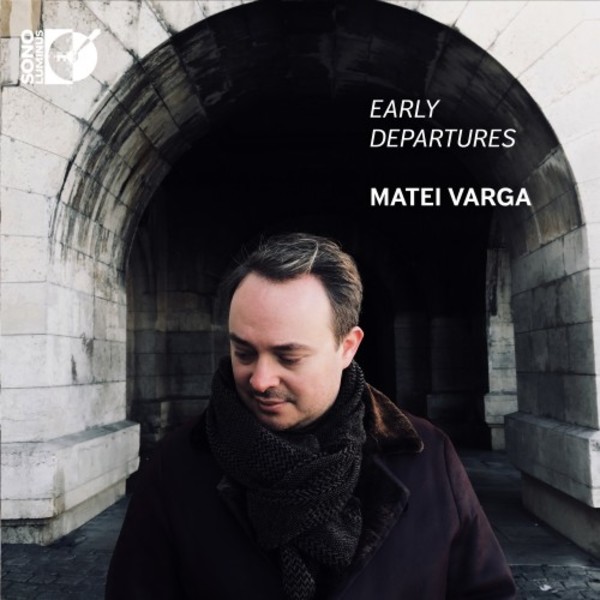
Early Departures
£13.25
Usually available for despatch within 2-3 working days
Despatch Information
This despatch estimate is based on information from both our own stock and the UK supplier's stock.
If ordering multiple items, we will aim to send everything together so the longest despatch estimate will apply to the complete order.
If you would rather receive certain items more quickly, please place them on a separate order.
If any unexpected delays occur, we will keep you informed of progress via email and not allow other items on the order to be held up.
If you would prefer to receive everything together regardless of any delay, please let us know via email.
Pre-orders will be despatched as close as possible to the release date.
Label: Sono Luminus
Cat No: DSL92223
Format: CD
Number of Discs: 1
Genre: Instrumental
Release Date: 13th July 2018
Contents
Works
Keyboard Concerto in D minor after Alessandro Marcello, BWV974Prelude in C sharp minor
Preludes (7)
In the Mists
Little Suite: Prelude, B35
Nocturne in A minor on a Moldovan theme
Nocturne in F sharp minor, op.6
Sonata Romantica, B13
Artists
Matei Varga (piano)About
‘As if the melancholy and longing mood of my musical roots weren’t sufficiently gloomy, I decided to pay homage to pianists who died young and who, while showing tremendous gifts, could not fulfill their entire potential as composers. We all know Dinu Lipatti, whose centenary we celebrated in 2017, as one of the truly great piano masters of all time. Fewer of us are aware, though, of his great desire to become a respected composer and his few but vivid attempts to fulfill that dream. He grew up surrounded by some of the most prominent names of that era: he was George Enescu’s godson, Nadia Boulanger’s pupil in Paris, and met Paul Dukas and Maurice Ravel during his student years at Ecole Normale. His writing borrows the subtle folklore undercurrent so typical of Enescu’s writing, the crisp and elegant suppleness of Ravel and occasionally the more adventurous and daring gestures of Dukas. I am honored to present here two little gems that have never been recorded before: the Little Suite: Prelude, WoO. – B.35 (none of the other projected movements were ever completed) and the Sonata Romantica, WoO. – B.13 which, in under 6 minutes, is a marvelous mixture of Lipatti’s best attributes as both composer and performer: elegance, nobility, graceful fire and authenticity.
‘Tudor Dumitrescu is much less known, but I dare say that is only because he died much younger (he was only 19 when the big 1977 earthquake in Bucharest literally crushed him under the ruins). I first saw Tudor in a faded black-and-white video recording in which he was performing the Tchaikovsky Piano Concerto no. 1 with the youthful exuberance of a young Van Cliburn and the perfect technical command of a mature Pollini. That recording was my first professional crush and one that inspired me to reach for new horizons in my first years of study. Tudor didn’t leave us much music, but the 9 Preludes recorded here are proof enough of his genius. I remember going to visit his mother - a picture of serene resignation - in order to receive from her own hands the score of these Preludes. She would move quietly through the rather austere apartment (I can see her whenever I play Prelude VI), pointing to pieces of fabric and broken objects which she saved from the debris of the earthquake. She would go at least once every day to the cemetery to visit his grave. And yet, with the exception, perhaps, of the B minor Prelude, finished days before the earthquake and unsettlingly premonitory, Tudor’s music has a youthful glow quite untouched by bitterness and tragedy.
Matei Varga’s artistry has received standing ovations from audiences around the world and superlative reviews from prominent critics. Noting that “it is hard to find the right words to describe the beauty” of Mr. Varga’s playing, Corriere della Sera’s chief critic Paolo Isotta praised the young artist as a “true poet of the keyboard, a musician of depth, and a genuine artist.” Other critics have found his performances “impressive” (Gramophone, 2016), “magical” (Süddeutsche Zeitung, 2009), “colorful, vivacious [and] engaging” (Le Diapason, 2012). Discovered at age 10 by soprano Mariana Nicolesco, he went on to win top prizes at the George Enescu International Piano Competition and the International Maria Canals Piano Competition. Mr. Varga is also a recipient of the Salon de Virtuosi Career Grant and a runner-up at the Vendome Prize in Lisbon, where he was singled out by Elisabeth Leonskaja who awarded him a special prize. He has appeared as a soloist and recitalist in many of the world’s leading concert halls, among them Carnegie Hall and Alice Tully Hall, Konzerthaus Berlin, the Auditorium du Louvre, National Center for the Performing Arts Beijing, Palau de la Música in Barcelona, the Romanian Athenaeum and Radio Hall in Bucharest. He is a frequent collaborator of cellist Laura Metcalf, violinist Gregory Harrington and recently has joined star ballerina Alina Cojocaru in performances at New York City Center and Jazz at Lincoln Center.
Error on this page? Let us know here
Need more information on this product? Click here